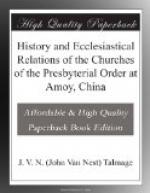But we are told that it is not desired that this connection with the Church in America should be perpetual. It will last only until the Church at Amoy has sufficient development to stand alone. Then, of course, our Church will consent to the separation. (A very different doctrine, by the way, from the “assertion” of the committee of Synod that the Church can not “voluntarily relinquish its powers.”) After that, the churches at Amoy which have been under our care, and those which have been under the care of the English Presbyterians, may again unite in one Denomination, if they see fit. This sounds pretty well. But look at it. First separate the churches long enough to engender rivalries and allow prejudices to grow up, and then attempt to unite them, and what will be the result? Unless they have a more liberal spirit than is usual in the churches in this land, instead of making one denomination out of two, we shall have three. But who shall be the judge when the proper time has arrived to liberate the Church in China, if the opinions of those on the ground, and of the native churches, are all to be ignored?
3. It will injure the efficiency of the Church at Amoy. Besides the objection—which the heathen will thus, as readily as the irreligious in this country, be able to urge against Christianity—furnished by the increase of Denominations, it will deprive the churches of the benefit of the united wisdom and strength of the whole of them for self-cultivation and for Christian enterprise, and will introduce a spirit of jealous rivalry among them. We know it is said that there need be no such result, and that the native churches may remain just as united in spirit after the organization of two Denominations as before. Such a sentiment takes for granted, either that ecclesiastical organization has in fact no efficiency (such is not the doctrine of our Church), or that the Chinese churches have arrived at a far higher state of sanctification than the churches have attained to in this land. Do not different Denominations exhibit jealous rivalry in this land? Why, your Missionaries are already frequently charged with being too liberal towards their English Presbyterian brethren in giving to them members and churches which, it is said, properly belong to us. Is Chinese human nature different from American?




